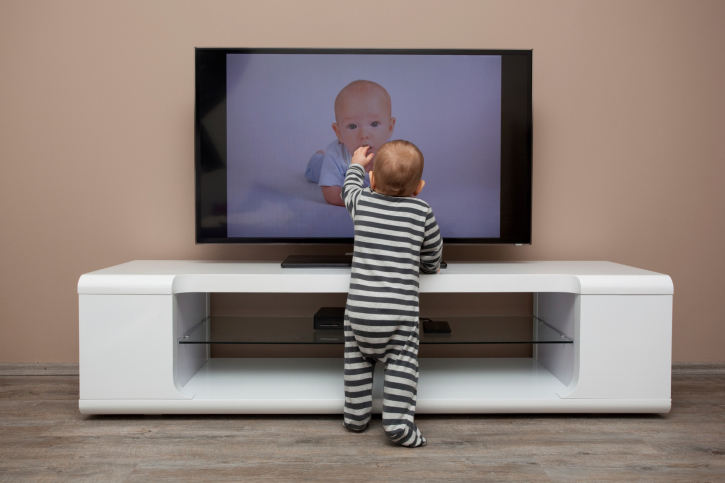Children learn best in the “3D” world, through interactions with parents, caregivers and peers. The research is clear - baby brains learn best from faces, not from screens!
Screens may include TVs, computers, tablets, cell phones, and even some children’s toys. Children under 12 months of age who view two or more hours of TV per day are six times more likely to have a language delay. You might be surprised to learn that even educational programs geared to young children, such as Sesame Street or Super Why can delay infant language. In one study, babies under 18 months who consistently watched baby DVDs such as Baby Einstein, had for every hour watched, 6 to 8 fewer words than those that didn’t watch.

Research indicates that exposure to children’s programming before the age of two and/or exposure to adult programming in the preschool years can have a significant impact on cognitive development and language development. This includes exposure to background TV, so be sure to turn it off when no one is watching! The programs that preschool children over the age of two watch should be age appropriate, and should not include adult programming.
Using screens to pacify or distract children can be tempting for parents, but it can also lead to dependence on an electronic device to be soothed or to intervene when a child is upset. In today’s world, parents will need to help children to learn a variety of healthy ways to cope with disappointments and frustrations without using screens.
Screens are all around us, so what can parents do?
- First of all, limit screen time as much as possible. Children under two should be exposed to screens for an hour or less a day. Preschoolers between 2 and 6 years old should be limited to two hours per day.
- Monitor programming. Make sure that infants are exposed only to appropriate infant programming and very minimally.
- Get involved! Parent involvement is essential - talk about what the child is watching, imitate the dialogue together, or act it out.
- The use of interactive features, such as noises & lights or buttons to push, may interfere with a child’s ability to focus and learn. Balance this with parent interaction which is actually more stimulating for the developing brain.
- Take turns during screen time to teach about sharing.
- Use mistakes and failures while playing electronic games together to teach about persistence.
- Make the connections between the screen and the real world. Apply concepts like counting or colours to the foods you by at the grocery store. Or, talk about the animals in a video and then look for them on a walk.
- Expose children to physical books from an early age (not e-books), and make reading together part of your routine.

May is Speech and Hearing Awareness Month, so to celebrate, we’d thought we’d share a list of six books about limiting screen time:
- Doug Unplugged by Dan Yaccarino
- hello! hello! by Matthew Cordell
- Chloe by Peter McCarty
- Blackout by John Rocco
- Press Here by Herve Tullet
- I’m Bored by Michael Ian Black
Now, get ready to unplug and read to with children!
If you have concerns about your child’s speech and language development, call Here4Kids.
